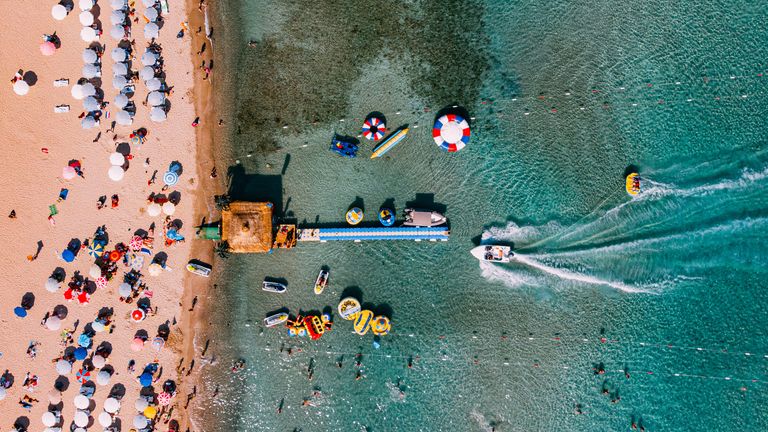Northern Ireland has indicated it will follow many of England’s incoming COVID-19 rules on international travel, as holiday firms experience a surge in bookings.
The country’s traffic light system for international travel will change from 4 October with a single “red list” of destinations and a “simplified process” for travellers for the rest of the world.
Travel companies say they have seen an increase in bookings after the UK government announced the current traffic light system of red, amber and green countries would be scrapped for England, also on 4 October.
COVID-19 travel tracker – How countries’ rates compare and what travel list they’re on
Transport Secretary Grant Shapps revealed on Friday that the system will be replaced early next month by a single red list of destinations.
From that point, travellers arriving in England from red countries will have to quarantine in a government-supervised hotel.
AdvertisementPeople who are fully vaccinated will no longer need a pre-departure test before returning to England from non-red list destinations, and from the end of October they will be able to replace the day-two PCR test with a cheaper lateral flow test.
Eight countries are being removed from the red list, including Turkey and the Maldives. PCR tests will still be required for people who are unvaccinated.
More on Covid-19 Related Topics: COVID-19CoronavirusNorthern IrelandTourismOne expert backed the change in rules because, he said, high rates in the UK mean it would be “churlish” to have obstacles in the way of foreign travel.
Steve Heapy, chief exec of Jet2, says of the “£1bn being spent by holidaymakers on PCR tests” only about “1% were genomic sequenced” for variants of concern as he welcomes changes to the coronavirus travel rules which will come into effect from 4 Oct. https://t.co/lqkze9PK0v pic.twitter.com/GtLTjJlkAJ
— Sky News (@SkyNews) September 18, 2021Dr Simon Clarke, associate professor in cellular microbiology at the University of Reading, added that travellers would be as likely to catch COVID on a trip to Torquay as to Turkey.
Jet2 boss Steve Heapy told Sky News the “responsible thing to do” was reopen step by step.
He said: “Other areas of the economy are pretty much back to normal – you can go and watch a football match amongst 75,000 people without having a lateral test or prove your vaccinations.
“I’m in favour of a full return to the old normal but doing it in a phased way seems sensible. This is a good first step.”
After earlier announcing that Jet2 bookings had spiked “by more than 250%”, he added that being on an aircraft was “extremely safe” due to the air being recycled every three minutes and the filters used.
Which countries will have us – and what are their travel restrictions?
Paul Charles, a travel consultant and founder and boss of the PC Agency, told Sky News the international travel changes are “major progress” and will help confidence.
But he added that there were “still many questions to be answered” after the government opted to keep some countries on the red list despite changes to the travel rules.
Thomas Cook’s chief executive said customers were “already booking in their droves” following the latest travel changes, with the holiday company experiencing its second-best day of bookings alone this year on Friday and expecting its “best weekend yet”.
Airlines including British Airways and easyJet also welcomed the major relaxing of travel rules for people coming in and out of England – but increased the pressure on the government to remove testing requirements altogether.
Transport Secretary Grant Shapps says the changes mean ‘a simpler, more straightforward system’TUI also said it had already seen “an uptick in bookings for Turkey in October” and expected a further boost in customer confidence with the new rules.
Meanwhile, online travel platform Skyscanner said it saw a 133% rise in traffic in the 30 minutes following Mr Shapps’s announcement, with “huge increases” in searches for destinations such as Turkey and the Maldives.
The optimism was not shared by all, however, with one scientist warning that the latest changes could not only risk new variants coming in, but make it harder to spot them if they arrive.
Professor Lawrence Young, professor of molecular oncology at the University of Warwick, said: “The main concern is what this means for virus genomic sequencing. How will we ensure that those who test positive on a lateral flow test isolate and take a PCR test?
“There’s no transparency behind this decision making” Paul Charles, founder of the PC Agency, says “there are still many questions to be answered” after the government opted to keep some countries on the red list despite changes to the travel rules. https://t.co/lqkze9PK0v pic.twitter.com/VnNVhI5j9t
— Sky News (@SkyNews) September 18, 2021“It is likely that this approach will reduce our ability to efficiently monitor the introduction of new variants into the country.”
Scotland’s government said it would drop the traffic light system but would not follow England in removing the pre-departure test requirement for the fully vaccinated returning from non-red list countries, and will not change to using lateral flow tests on the second day after returning.
The Welsh Government said it was looking at the UK government’s proposed changes, but was worried they could weaken the ability of stop new forms of infection being imported.
Northern Ireland said anyone travelling there from the EU and the US who is fully vaccinated will no longer have to self-isolate or take a day-eight PCR test.
From 4 October, fully vaccinated travellers from a number of countries, including Canada, Australia, Israel and New Zealand, will be included in the policy.
